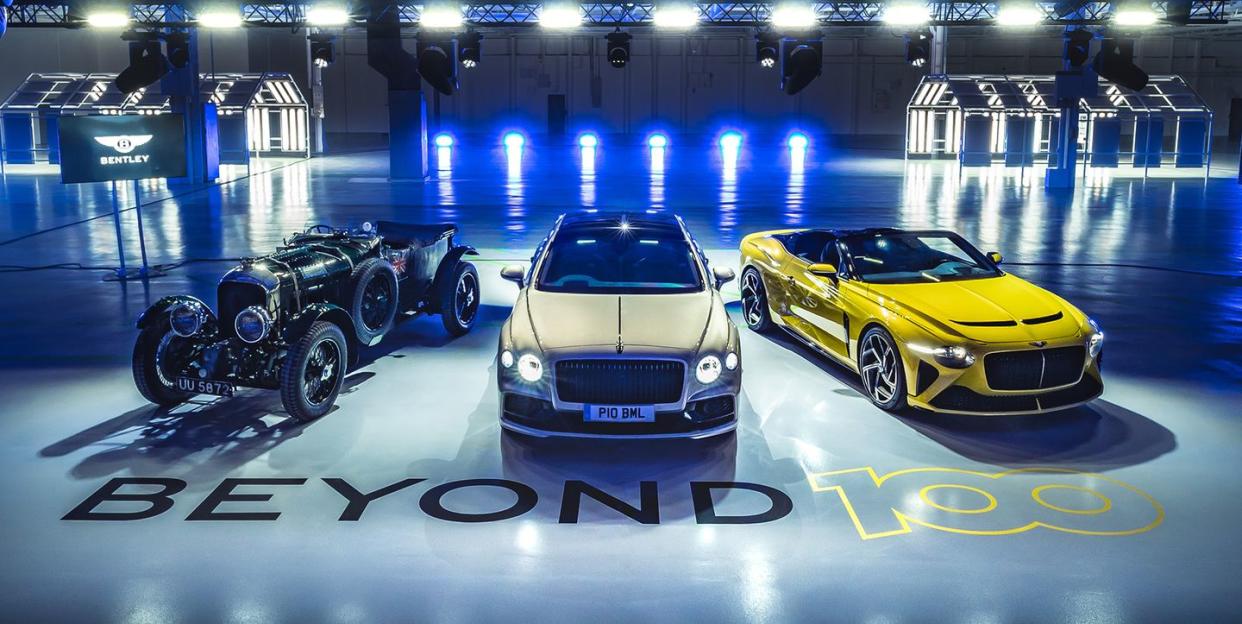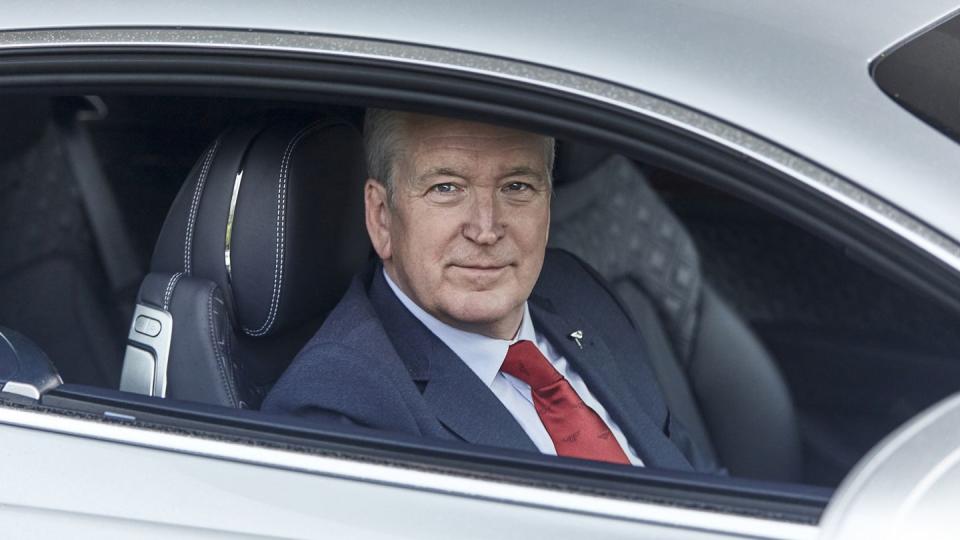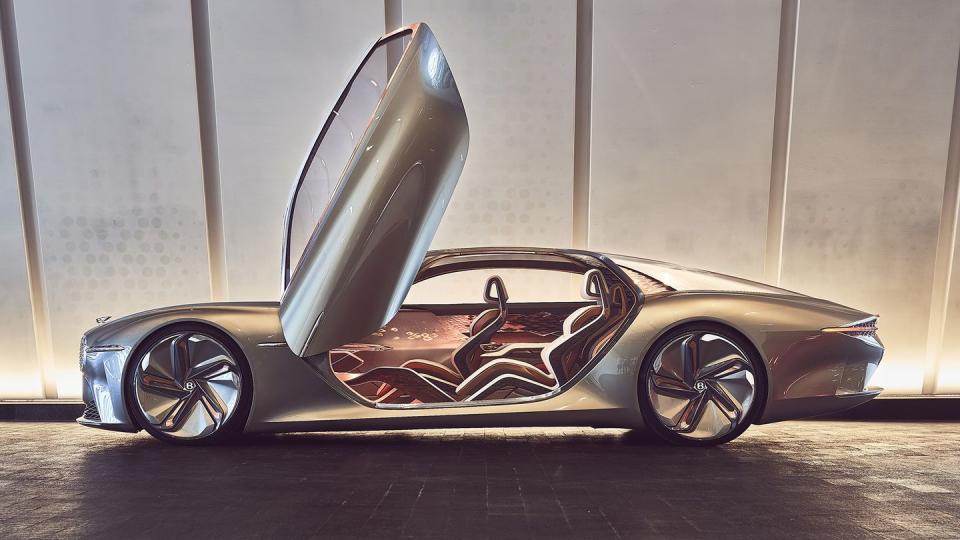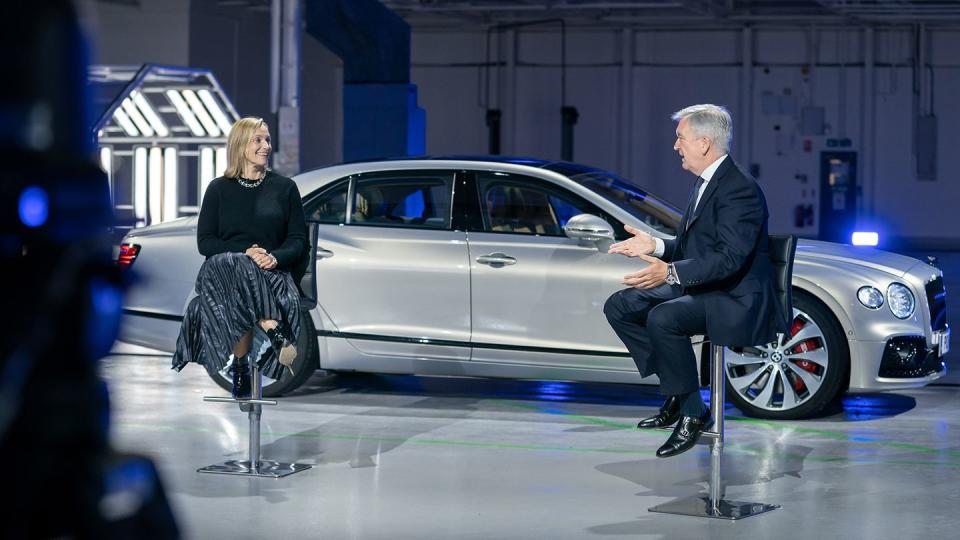Bentley Plans to Go EV-Only by 2030, but There Are Many Steps to Get There

Bentley will produce only PHEVs & EVs after 2026
The automaker will go EV-only by 2030
Bentley CEO says rapid progress in battery tech is needed to make this happen
We're living in the final decade of new internal combustion-engined Bentley models. Bentley plans to phase out gas and diesel-engined models entirely by 2030 as part of its transformation into an EV maker, after fielding its first battery-electric vehicle in 2025. But before that happens, Bentley will offer plug-in-hybrid models as a stepping stone to this goal, adding to the Bentayga PHEV currently available to buyers with a plan to offer plug-in hybrid versions of all of its cars in a relatively short span of time, all part of a strategy Bentley calls Beyond 100.
Among other things, this means that by 2026 Bentley will offer only plug-in hybrid models and battery-electric models. The automaker framed these plans in the context of becoming an end-to-end carbon neutral organization, while admitting not all the change is customer-driven -- regulators are certainly driving some change.
"The Beyond 100 strategic plan is an extension of two decades of forward thinking, innovation and achievement," the automaker said. "Acutely aware of the responsibility to consider its environmental, social an economic impact, Bentley has transformed its 80-year-old headquarters into the UK's single carbon neutral luxury car factory. In parallel, the luxury marque has grown to operate in more markets than ever before, 68, while creating a long-term, consistent, sustainable business model, a truly solid basis to build for a second century."
Just what plug-in hybrid models can we expect to land next? Bentley did not spell out which ones, but the automaker's lineup is small enough to be able to guess: the Continental GT, the main volume model for the better part of the last 20 years, is likely to receive a PHEV version, as will the related Flying Spur sedan.

These targets don't feel particularly distant, especially as it concerns its PHEV models, and they paint a picture of a major transformation for the brand that has seen its share of setbacks over the past two decades under Volkswagen's wing.
For instance, Bentley executives describe the first quarter of 2020 as the best quarter in company history, followed by the worst one with Bentley posting a record loss due to the pressures of the pandemic that has forced it to cut 800 jobs. Bentley is still a relatively small automaker by many standards, delivering just over 11,000 cars in 2019, its 100th anniversary year. So it is deeply dependent on the market success of individual models, and with a small lineup any mistake could prove costly. Bentley still believes it will crack the 10,000 vehicle mark this year, but whether it can break even for the year is still an open question.
Autoweek spoke to Bentley CEO Adrian Hallmark on the challenges the automaker faces over the next decade in achieving the goals of the Beyond 100 plan, especially when it comes to today's available EV tech. Hallmark offered a strong note of caution about what can be done with the tech available to automakers today, and how it will look in another decade.
"What we’ve got is not currently sustainable," Hallmark told Autoweek. "Not a billion cars on the road with lithium-ion batteries that weigh 10 times the weight of an engine, spontaneously combust if punctured and need such careful recycling that it is an environmental and industrial challenge beyond anything that anyone has yet imagined… Because there’s nothing better in the meantime, but in 15 – 25 years we will look back and think 'what were we doing.'"

Hallmark also indicated Bentley needs to pick its battles when it comes to drivetrains, suggesting the company cannot afford to offer as much variety as some would like to see given its typical annual sales.
"We would love to keep working on six engines plus battery electric vehicles plus hybrids," Hallmark said. "But we haven't got the capacity to do it. You've got to pick a point in time where battery power density, especially for bigger cars, is the liberator for us. We've always said that the mid-2020s is the time when you can expect to see 120-plus kilowatt-hour batteries coming through the supply chain."
Among other things this means that for Bentley-sized models and customers, the battery tech isn't there yet to make a logical case to its customers to go electric. Does this mean the battery tech will have to catch up first before Bentley can make a proposition to its customers that will make sense, price and range-wise? It definitely sounds like it to Hallmark.
"You need 120 to 140 kilowatt-hour batteries to drive a Range Rover or a Bentayga to give you parity with the current engines," Hallmark told Autoweek. "You could say 'well, make it a 150-mile range car then' but then it's a joke, you'd pay a lot of money for a car that can go less far."

Hallmark also indicated that battery-related challenges aren't the only ones Bentley faces in 2025, when it fields its first EV, and by 2030 when it has an all-EV lineup. The role of PHEV technology as a stepping stone, in effect, will be relatively brief, transforming Bentley from a PHEV-majority range to an EV range in less than five years. Asked about the brief span of time in which PHEVs will rule the Bentley range, Hallmark indicated he preferred a much more rapid transition from internal combustion engines to PHEVs, and a rapid transition from PHEVs to EVs, as Bentley cannot afford to have too much variety when it comes to powerplants given its annual output.
"You’ve got to make a corporate decision on how much overlap you want. And I would always say the less the better," Hallmark told Autoweek. "Don’t forget, by the time we get to 2030 the legislation on batteries and the energy efficiency of cars will be no less challenging than it is now with combustion engines."
In addition to other things, this means that Bentley PHEV drivetrains will be produced for an incredibly short period of time before they're replaced by battery-electric vehicles in 2030. So PHEV drivetrains will be among the shortest-produced Bentley drivetrains in decades.
But what could we expect to be the first Bentley EV in 2025?
The automaker gave a good hint regarding its first EV with the Bentley EXP 100 GT concept, shown in 2019, featuring a variety of sustainable materials including 5,000-year-old copper-infused Riverwood, a leather-like textile upholstery that's a byproduct of wine-making and traditional wool carpets. Bentley is applying the same approach to its factory as well.

"The Crewe facility will continue to improve its environmental operations. By the end of this year, all suppliers will have passed a sustainability audit, verifying their sustainability credentials," the automaker said in announcing its Beyond 100 plans. "In the future, by the end of 2025, the company intends to reduce its factory environmental impact by focusing on energy consumption, CO2 emissions, waste water, use of solvents in the paint process and becoming plastic neutral. This will result in a climate positive factory by 2030, actively reducing levels of carbon in the atmosphere, while in parallel the business invests in renewable energy and forestation projects."
Still, the automaker has plenty of challenges to overcome before its lineup begins to fill up with plug-in hybrids. The business pressures the pandemic produced have caused much industry turmoil, and the end of the pandemic is not quite in sight. China's plans to switch to what it calls New Energy Vehicles -- once hailed as a guaranteed producer of PHEVs and EV sales -- faces some of its own uncertainty, even as the country posted a quick recovery from the pandemic when it comes to car sales.
But elsewhere, including the U.S., is EV infrastructure evolving fast enough to support an EV-only brand a decade from now? Like other automakers making plans to switch to an EV-only lineup within a few short years, all the other pieces have to be in place including a charging infrastructure, advances in battery technology, and even things like a mining industry that can support a much greater volume of EV production than we see now. Even Tesla is starting to run into issues with its battery suppliers and the mining of metals needed for battery production. And Tesla is just one EV-only automaker. What will these pressures look like when most of the automotive industry goes electric?
"It's trendy to talk about sustainability, isn't it?" Hallmark quipped at the start of a press conference announcing the Beyond 100 plan.
What's certain for now is that the next 10 years will see greater technological change and transformation for Bentley than perhaps the last 50 years saw for the brand.
Sign up for comments and let us know what you think about Bentley's plans for the next decade.
